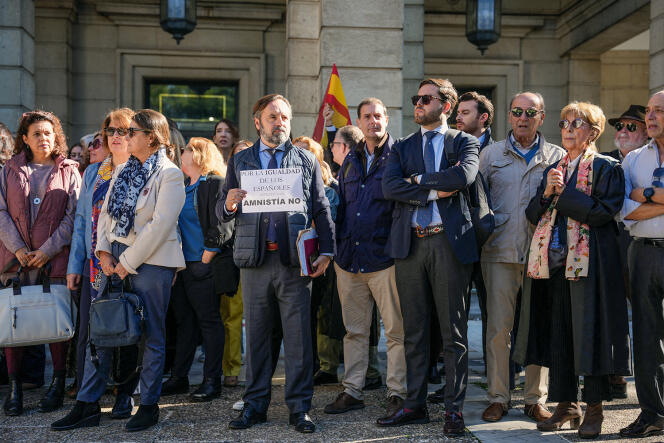Among Spanish magistrates, it is an understatement to say that unease reigns. Gatherings of black robes are increasing. In Toledo, Segovia, Seville and Salamanca, hundreds of judges are demonstrating to ensure that the independence of justice is respected.
At issue: the agreement signed on November 9 between the Spanish Socialist Workers’ Party (PSOE) and the Catalan independence party Junts, which allowed the Socialist Prime Minister, Pedro Sanchez, to remain at the head of the government.
This text – sealed in Belgium, where the former president of the Catalan government Carles Puigdemont fled to escape legal proceedings – aims to provide amnesty for all crimes committed “with the intention of claiming, promoting or obtaining the secession or independence of Catalonia” as part of the self-determination referendum of 1er October 2017 and a symbolic consultation organized on November 9, 2014.
In itself, the possibility of an amnesty already divides the judiciary, with some seeing it as an attack on the principle of equality of all before the law. But it is above all a term used in the agreement which set off all the associations of judges, progressive and conservative: the “lawfare”, or the instrumentalization of justice by politics. A real “bad word” for magistrates.
“What is very serious is that the creation of parliamentary commissions is planned which will investigate judicial decisions and make recommendations for legislative changes accordingly, regrets Sergio Oliva, spokesperson for the Francisco de Vitoria judicial association. The only thing that judges do is enforce the law, and if a decision is not pleasing, our system guarantees appeals before other authorities. »
An old debate
The debate on the independence of justice is actually not new in Spain. The mandate of the General Council of the Judiciary (CGPJ), the equivalent in France of the Council of the Magistracy, twelve members of which must be appointed by Parliament by a reinforced three-fifths majority, expired five years ago. Since then, the People’s Party (PP, right) has continued to block the renewal of this body for appointing judges, where a majority of conservative-leaning judges sit.
For its part, the socialist government appointed its justice minister, Dolores Delgado, as State Attorney General in 2019, and the next justice minister, Juan Carlos Campo, as well as the general director to the constitutional affairs of the government, Laura Diez Bueso, within the Constitutional Court in 2022, thus ensuring that the high court has a majority sensitive to its positions.
You have 55% of this article left to read. The rest is reserved for subscribers.
